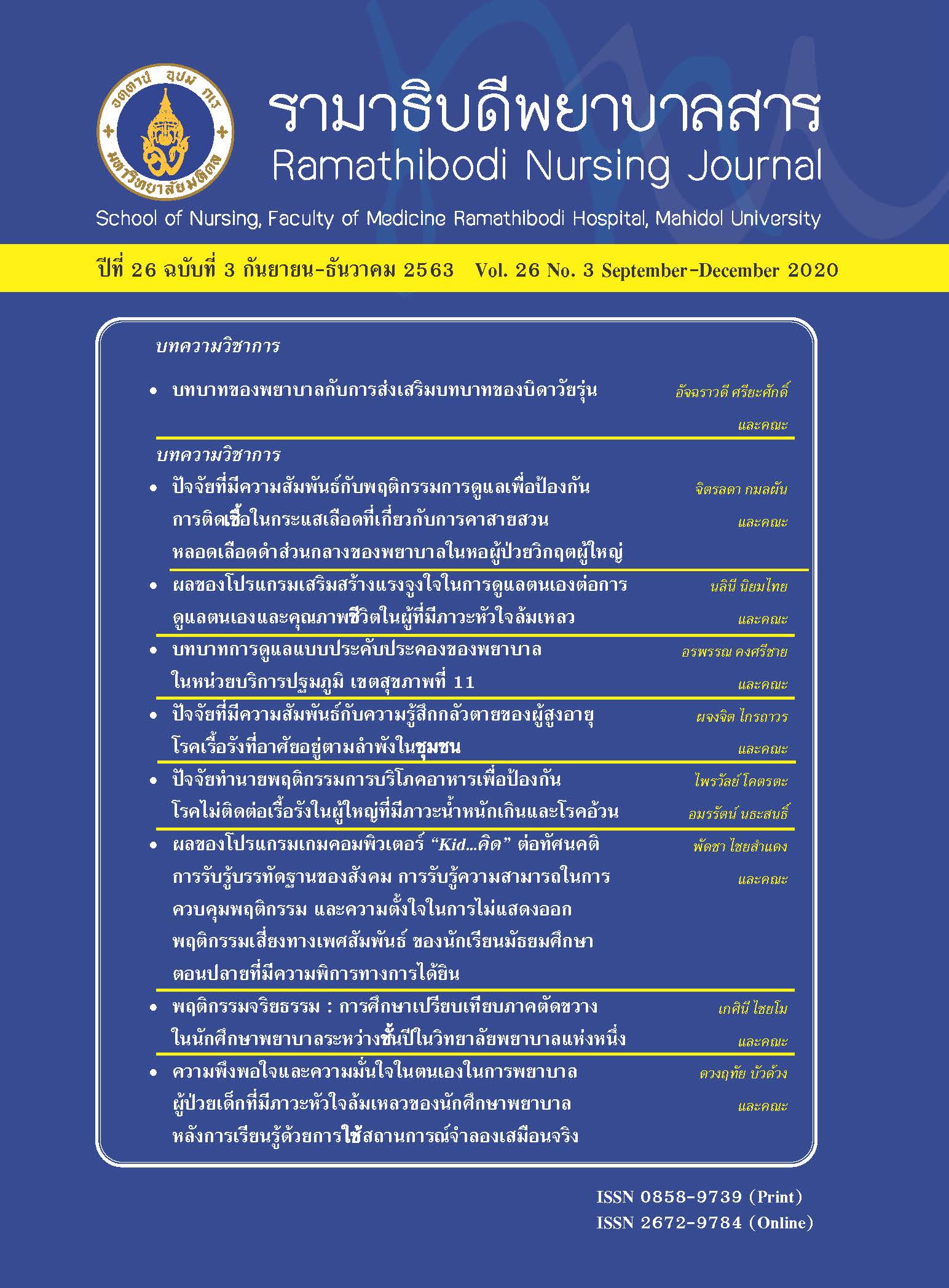Factors Influencing Food Consumption Behaviors to Prevent Non-Communicable Diseases among Adults with Overweight and Obesity
Main Article Content
Abstract
This research aimed to examine factors influencing food consumption behaviors to prevent non-communicable diseases (NCDs) among adults with overweight and obesity. The sample consisted of 142 adults aged 19-59 years with overweight and obesity, who were recruited using multistage random sampling. The research instruments included seven questionnaires to elicit personal information, food consumption behaviors to prevent NCDs, perceived susceptibility to NCDs, perceived severity of NCDs, perceived benefits of food consumption behaviors to prevent NCDs,perceived barriers to food consumption behaviors to prevent NCDs, and cue to action.Data were analyzed using descriptive statistics, Pearson, s correlation coefficient, and multiple regression analysis with the Enter method. The result revealed that all seven
study variables jointly accounted for 35% of the variance in food consumption behaviors to prevent NCDs. However, only the perceived barriers to food consumption behaviors significantly explained of the variance in food consumption behaviors to prevent NCDs.The results of this study could be utilized as basic information for healthcare providers to promote healthy food consumption behaviors by finding strategies for minimizing perceived barriers to healthy food consumption among adults with overweight and
obesity.
Keywords: Overweight, Obesity, Food consumption behaviors, Non-communicable disease, Adults
Article Details
บทความ ข้อมูล เนื้อหา รูปภาพ ฯลฯ ที่ได้รับการตีพิมพ์ในรามาธิบดีพยาบาลสาร ถือเป็นลิขสิทธิ์ของวารสาร หากบุคคลหรือหน่วยงานใดต้องการนำทั้งหมดหรือส่วนหนึ่งส่วนใดไปเผยแพร่หรือเพื่อกระทำการใด ใด จะต้องได้รับอนุญาตเป็นลายลักษณ์อักษรจากรามาธิบดีพยาบาลสารก่อนเท่านั้น
References
Ministry of Public Health. Non-communicable disease prevention and control project under cooperational
strategies between Thai government and World Health Organization. 2017 [cited 2017 March 3]. Available
from: http://www.searo.who.int/thailand/areas/ccsncd-proposal-thai.pdf (in Thai)
Thai Health. Survey finding, chronic diseases increased with 1 in 10 labor-aged person. 2013. [cited 2018
February 25]. Available from: https://www.thaihealth.or.th/Content/20404- Survey results, deteriorating
health of labor-aged person%201%20ใน%2010%20 ป่วยเป็็นโรคเรื้อรััง.html
World Cancer Research Fund International. The link between food, nutrition, diet and non-communicable
diseases. 2014. [cited 2018 August]. Available from:https://www.wcrf.org/sites/default/files/PPA_NCD_
Alliance_Nutrition.pdf World Bank. Background paper pacific possible: Health and non-communicable disease.
[cited 2018 August 15]. Available from: https//www.worldbank.org/PacificPossible
Institute of Medical Research and Technology Assessment.Literature review: the current situation and care model of non communicable diseases. Nonthaburi: Art Qualify;2014. (in Thai)
Division of Non Communicable Disease. Integrated health services handbook for working-age. 2014 [cite 2018
February 19]. Available from: http://www.thaincd.com
Pongutta S, Kunpeuk W. Thailand food and nutrition:where are we now. Nonthaburi: n.p.; 2015. (in Thai)
Health Systems Research Institute. Research trends is non communicable diseases: NCD. 2014. [cited 2018 March 16]. Available from: https://www.hsri.or.th/researcher/research /trend/detail/4999
Abo-Elgamelen H, Essa E, El-Shemy M. Prevalence of lifestyle associated risk factors for non-communicable
diseases and its effect on quality of life among nursing students, Faculty of Nursing, Tanta University, 2015
Thai Health. Chronic diseases increased with middle-aged person. 2017. [cited 2018 February 13]. Available from:http://www.thaihealth.or.th/
Olatona FA, Onabanjo OO, Ugbaja RN, Nnoaham KE,Adelekan DA. Dietary habits and metabolic risk factors
for non-communicable diseases in a university undergraduate population [Electronic version]. J Health,
Popul Nutr. 2018;37,21. https:// doi.org/10.1186/s4 1043-018-0152-2
Department of Medical Services, Ministry of Public Health.Obesity prevention and care strategies. 2010. [cited 2020 May 13]. Available from: http://www.imrta.dms.moph.go.th/imrta/images /pdf_cpg/2553/53-4.pdf
Wongchan W. Metabolic syndrome in adult: Selfmanagement.Journal of The Royal Thai Army Nurses.
;19:16-24. (in Thai)
World Health Organization. Global health observatory (GHO) data. 2020. [cited 2020 May 13]. Available from:
https://www.who.int/gho/ncd/risk_factors/overweight _text/en/
Beck MH. The health belief model and sick role behavior.In Becker MH (Ed.), The health belief model and personal health behavior. Thorofare, NJ: Charles B. Slack; 1974,p.88-92
Nangyaem A. Factors predicting food consumption behaviors among hypertensive patients [dissertation]. ChonBuri: Burapha University; 2007. (in Thai)
Hanarong A, Toonsiri C, Rattanagreethakul S. Factors affecting eating behaviors among hypertensive patients.The Journal of Faculty of Nursing Burapha University.2017;25(3):52-65. (in Thai)
Natason A, Piaseu N, Pinthong P. Nutritional knowledge,attitude toward food, food behavior, and nutritional status in semi-rural community, Ubon Ratchathani Province.Ramathibodi Nursing Journal. 2017;23(3):344-57.
(in Thai)
Maytapattana M. Factors associated with food consumption behaviors of nursing students. The Journal of Faculty of Nursing Burapha University. 2017;25(3):20-9.(in Thai)
Valverde G. et al. Study of families: environmental and cultural factors associated with overweight and obesity [Electronic version]. Enfermeria Global. 2017;45;11-9.
Chaitokkia S. Factors affecting food consumption behaviors of adults in northeast Thailand. Research and
Development Journal, Loei Rajabhat University. 2018;13 (45):68-78. (in Thai)
Thonglong T. Lifestyle and behaviors of Thai people in Ubon Ratchathani province. Master thesis in Sports
Science. Chulalongkorn University; 2013. (in Thai)
Jaide C, Santati S, Kongsaktrakul C. Factors related to child care workers, behavior in prevention of acuterespiratory infection in child care center. Ramathibodi Nursing Journal.2012;18(3):389-403. (in Thai)
Cohen J. Statistical power analysis for the behavioral science (2nded.). New York, United States of America:
Lawrence Erlbaum Associates; 1988.


